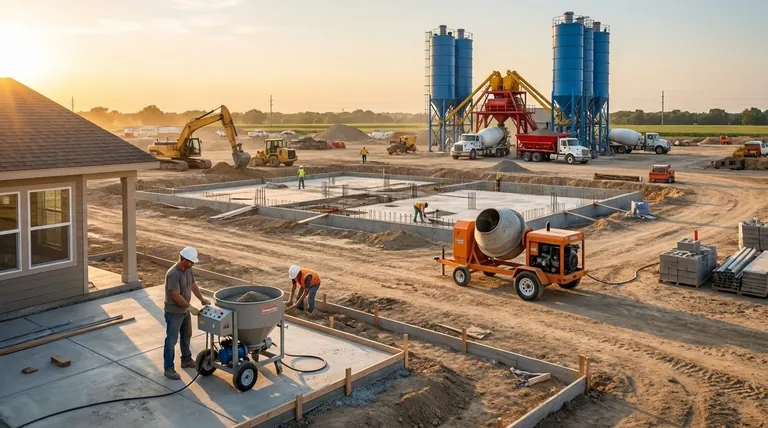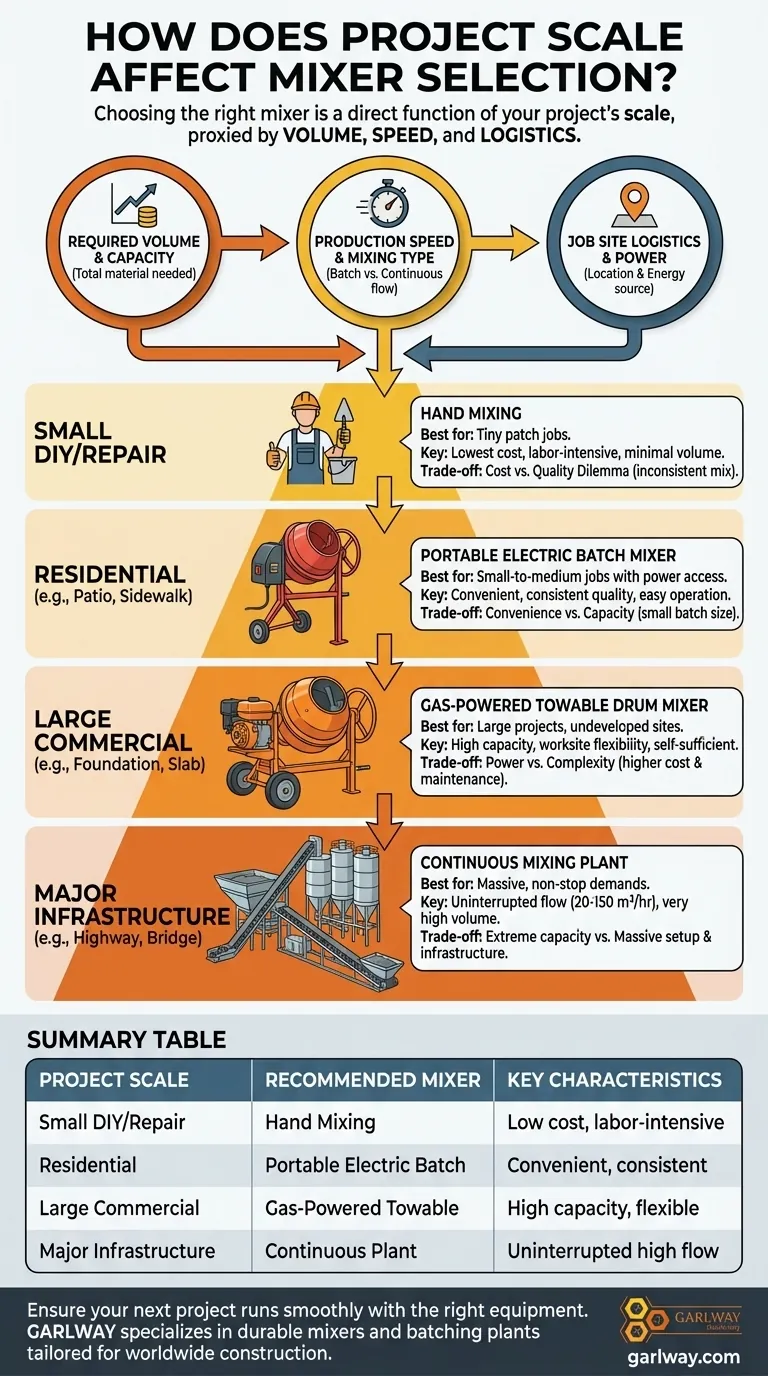Choosing the right mixer is a direct function of your project's scale. For very small DIY tasks, hand mixing may suffice. As projects grow to residential sidewalks or patios, portable electric mixers become necessary. For large-scale commercial or infrastructure work, high-capacity, gas-powered towable or continuous mixers are required to handle the significant volume and speed demands.
Project scale is more than just physical size; it's a proxy for the required volume, speed, and location logistics. Your mixer choice must align with its mixing type (batch vs. continuous), capacity, and power source to meet these core demands efficiently.

The Core Metrics of Project Scale
When we talk about "scale," we are evaluating a few specific operational needs. A large project isn't just bigger; it operates on a completely different timeline and has different logistical constraints than a small one.
Required Volume and Capacity
The most obvious factor is the total volume of material you need to mix. The mixer's capacity must be able to handle this volume efficiently.
For a tiny patch job, mixing a single bag in a wheelbarrow by hand is feasible. For a small sidewalk, a portable electric mixer that can handle a few bags at a time is appropriate.
However, large construction projects require mixers with significant drum capacity to ensure a consistent and timely supply of concrete for large pours.
Production Speed and Mixing Type
The speed at which you need the mixed material dictates the type of mixer required. There are two primary types: batch and continuous.
Batch mixers are used for small to medium projects, like driveways or foundations. They mix one finite quantity, or "batch," at a time. This allows for precise control over smaller volumes.
Continuous mixers are industrial machines for massive projects like highways or bridges. They produce a constant, uninterrupted flow of material, often at rates of 20 to 150 cubic meters per hour, something a batch mixer could never achieve.
Job Site Logistics and Power
The project's location and available resources are critical. Mixer selection is often determined by portability and the availability of electricity.
Small residential projects typically have access to standard electrical outlets, making portable electric mixers an ideal, low-maintenance choice.
Large commercial job sites are often undeveloped and lack readily available power. Here, gas-powered, towable mixers are essential for their higher capacity and self-sufficiency.
Understanding the Trade-offs
Every mixer type represents a compromise between cost, capacity, convenience, and quality. Choosing the right one means understanding these compromises.
Hand Mixing: The Cost vs. Quality Dilemma
Hand mixing is the cheapest option but is only suitable for the smallest of tasks. It is labor-intensive, slow, and makes achieving a consistent mix very difficult, which can compromise the final strength of the concrete.
Portable Electric Mixers: Convenience vs. Capacity
These mixers offer excellent consistency for small-to-medium residential jobs. They are relatively inexpensive, easy to move, and simple to operate. Their primary limitations are their small batch size and dependence on a nearby power source.
Large Gas-Powered Mixers: Power vs. Complexity
Gas-powered towable mixers provide the high capacity and worksite flexibility needed for commercial jobs. They can produce large quantities of material anywhere. This power comes with higher initial costs, more complex maintenance, and greater logistical challenges in transport and setup.
Making the Right Choice for Your Goal
Select your equipment by matching its core strengths to your project's non-negotiable requirements.
- If your primary focus is a small DIY repair: Hand mixing is often sufficient, providing the lowest cost for minimal volume.
- If your primary focus is a residential project like a patio or sidewalk: A portable electric batch mixer offers the best balance of convenience, consistent quality, and affordability.
- If your primary focus is a large commercial foundation or slab: A gas-powered, towable drum mixer is necessary for its high capacity and independence from a fixed power source.
- If your primary focus is major infrastructure work: A continuous mixing plant is the only option that can meet the massive, non-stop volume demands.
By correctly matching your mixer's capabilities to your project's volume and speed demands, you ensure efficiency and a professional-quality result.
Summary Table:
| Project Scale | Recommended Mixer Type | Key Characteristics |
|---|---|---|
| Small DIY/Repair | Hand Mixing | Low cost, labor-intensive, minimal volume |
| Residential (e.g., patio, sidewalk) | Portable Electric Batch Mixer | Convenient, consistent quality, needs power source |
| Large Commercial (e.g., foundation) | Gas-Powered Towable Drum Mixer | High capacity, worksite flexibility, higher cost |
| Major Infrastructure (e.g., highway) | Continuous Mixing Plant | Uninterrupted flow, very high volume (20-150 m³/hr) |
Ensure your next project runs smoothly with the right equipment. GARLWAY specializes in construction machinery, offering durable winches, concrete mixers, and batching plants tailored for construction companies and contractors worldwide. Let our experts help you select the ideal mixer for your project's scale and demands. Contact GARLWAY today for a personalized consultation!
Visual Guide

Related Products
- HZS120 Ready Mix Concrete Batching Plant Commercial Mud Cement Mixer
- Commercial Electric Concrete Mixer Machine HZS 50 Small Batch Plant for Sale
- Commercial Construction Mixer Machine for Soil Cement Mixing Concrete
- Portable Concrete Mixer Machine Equipment for Mixing Concrete
- Ready Mixer Machine for Construction Ready Mix Machinery
People Also Ask
- How does a ready-mix concrete plant work? A Guide to Efficient, High-Quality Production
- How does ready-mix work? A Guide to Efficient, High-Quality Concrete Delivery
- How to start a concrete plant business? A Step-by-Step Guide to Launching Your Venture
- What are the advantages of ready mix concrete? Higher Quality, Efficiency & Cost Savings
- How do you maintain a concrete batching plant? Maximize Uptime & Extend Equipment Life



















